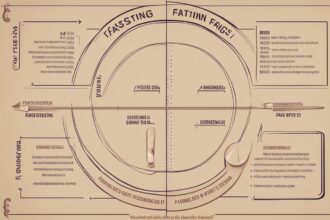Hey there, health enthusiasts! If you’ve ever wondered whether fasting or dieting is the better path to achieving your wellness goals, you’re not alone. Both approaches have passionate advocates and promising results, but they’re fundamentally different in how they work with your body. Today, we’re diving deep into the world of fasting benefits and comparing them to traditional dieting. I’ll break down the science, share practical tips, and help you decide which might suit your lifestyle best. Whether you’re curious about intermittent fasting, extended fasts, or calorie-restrictive diets, let’s unpack what each offers and how they impact your health.
What Is Fasting, and Why Are People Talking About Its Benefits?
Fasting isn’t just a trend; it’s a practice rooted in history, often tied to cultural or religious traditions. At its core, fasting means abstaining from food (and sometimes drink) for a specific period. Modern fasting, especially intermittent fasting (IF), has gained massive popularity for its potential health perks. Think of IF as a cycle of eating and fasting windows—like the 16:8 method, where you fast for 16 hours and eat during an 8-hour window. The buzz around fasting benefits isn’t just hype; research suggests it can support weight loss, improve metabolic health, and even enhance brain function (Mattson et al., 2017). Unlike dieting, fasting focuses on when you eat rather than what you eat—though quality still matters. People love it for its simplicity: no calorie counting, just timing.
How Does Dieting Differ from Fasting?
Dieting, on the other hand, is all about what and how much you eat. It often involves cutting calories, restricting food groups (think keto or paleo), or following structured meal plans. The goal is usually weight loss, but diets can also target specific health issues like high cholesterol or diabetes. While fasting lets your body rest from constant digestion, dieting tweaks your intake to create a calorie deficit or balance nutrients. However, diets can feel restrictive, and studies show many people struggle to stick with them long-term (Mann et al., 2007). Fasting, with its focus on timing, often feels less like a chore to some—though it’s not without challenges, as we’ll see later.
Key Fasting Benefits Backed by Science
Let’s get into why so many are raving about fasting benefits for health and wellness. Fasting does more than just help with weight management; it triggers fascinating processes in your body. Here are some standout advantages:
- Weight Loss and Fat Burning: Fasting can push your body into ketosis, where it burns stored fat for energy. Studies show intermittent fasting is as effective as calorie restriction for shedding pounds (Varady et al., 2013).
- Improved Insulin Sensitivity: By giving your system a break from constant eating, fasting can lower insulin levels and improve how your body handles sugar, reducing diabetes risk (Halberg et al., 2005).
- Cellular Repair via Autophagy: During fasting, your cells kickstart a “clean-up” process called autophagy, removing damaged components. This may protect against aging and disease (Mizushima & Komatsu, 2011).
- Brain Health Boost: Fasting may enhance brain function by increasing levels of brain-derived neurotrophic factor (BDNF), a protein linked to learning and memory (Mattson et al., 2017).
These health benefits of fasting make it a compelling choice, especially for those looking beyond just weight loss. But it’s not a one-size-fits-all solution, and we’ll explore that soon.
The Pros and Cons of Dieting for Health Goals
Dieting has been the go-to for weight loss and health improvement for decades, and it’s not hard to see why. Structured diets like the Mediterranean or DASH diet are backed by research for reducing heart disease risk and improving overall wellness (Estruch et al., 2013). You’ve got control over nutrients, portion sizes, and food quality. But dieting isn’t perfect. Many plans are hard to sustain, and “yo-yo dieting”—losing and regaining weight—can mess with your metabolism over time (Mann et al., 2007). Plus, the mental load of tracking calories or avoiding favorite foods can lead to stress or disordered eating for some. Unlike the fasting benefits of simplicity, dieting often requires more planning and willpower.
Practical Tips: Should You Choose Fasting or Dieting?
Deciding between fasting and dieting depends on your goals, lifestyle, and how your body responds. I’ve tried both, and honestly, it’s about finding what feels sustainable for you. Here are some tips to help you choose and get started:
- Start Small with Fasting: If you’re new to fasting, try a 12:12 schedule (12 hours fasting, 12 hours eating) before jumping into 16:8. It eases your body into the rhythm.
- Focus on Nutrient-Dense Foods: Whether fasting or dieting, prioritize whole foods—veggies, lean proteins, healthy fats—to maximize benefits and avoid nutrient gaps.
- Listen to Your Body: Fasting isn’t for everyone. If you feel dizzy or overly fatigued, break the fast. Dieting shouldn’t leave you starving either; adjust portions if needed.
- Track Progress Beyond the Scale: Notice energy levels, mood, or sleep quality. Both fasting and dieting impact more than just weight.
- Consult a Professional: If you have medical conditions like diabetes, talk to a doctor or dietitian before starting either approach.
Experimenting with intermittent fasting advantages or a balanced diet plan can reveal what clicks for you. I found fasting easier during busy weeks since I didn’t have to meal-prep constantly, but a structured diet helped when I needed more control over cravings.
Potential Risks: Fasting and Dieting Aren’t Without Challenges
Before you jump on the fasting or dieting bandwagon, let’s talk risks. Fasting can lead to irritability, headaches, or low energy, especially if you’re not hydrating or easing into it. For some, extended fasting might even trigger overeating later, undoing those fasting benefits (Varady et al., 2013). Dieting has its pitfalls too—restrictive plans can cause nutrient deficiencies or foster an unhealthy relationship with food. Both approaches require mindfulness. If you’ve got a history of eating disorders, fasting or strict dieting might not be ideal without guidance. The key is balance and self-awareness; neither method is a magic bullet.
In wrapping up, the fasting vs dieting debate doesn’t have a clear winner—it’s about what aligns with your life and health needs. Fasting offers unique perks like metabolic flexibility and cellular repair, making the fasting benefits hard to ignore for many. Dieting, though, provides structure and targeted nutrition, which can be crucial for specific goals. I’d say try a mix if you’re unsure: pair intermittent fasting with a nutrient-rich eating plan to get the best of both worlds. Remember, consistency beats perfection. What’s your take—have you tried fasting or dieting? Drop your thoughts below, and let’s keep this convo going!
References
- Estruch, R., Ros, E., Salas-Salvadó, J., et al. (2013). Primary prevention of cardiovascular disease with a Mediterranean diet. New England Journal of Medicine, 368(14), 1279-1290.
- Halberg, N., Henriksen, M., Söderhamn, N., et al. (2005). Effect of intermittent fasting and refeeding on insulin action in healthy men. Journal of Applied Physiology, 99(6), 2128-2136.
- Mann, T., Tomiyama, A. J., Westling, E., et al. (2007). Medicare’s search for effective obesity treatments: Diets are not the answer. American Psychologist, 62(3), 220-233.
- Mattson, M. P., Longo, V. D., & Harvie, M. (2017). Impact of intermittent fasting on health and disease processes. Ageing Research Reviews, 39, 46-58.
- Mizushima, N., & Komatsu, M. (2011). Autophagy: Renovation of cells and tissues. Cell, 147(4), 728-741.
- Varady, K. A., Bhutani, S., Klempel, M. C., et al. (2013). Alternate day fasting for weight loss in normal weight and overweight subjects: A randomized controlled trial. Nutrition Journal, 12, 146.






